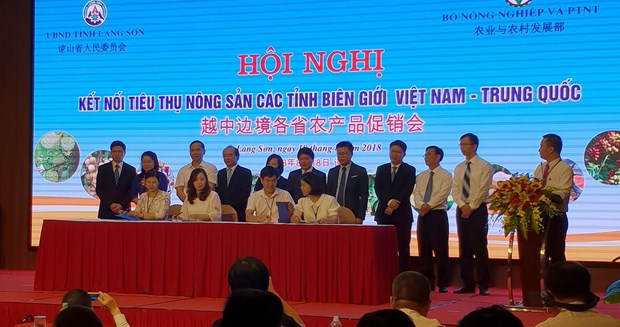Farm produce exports to China face higher quality standards
Vietnam’s agricultural and aquatic exports to China are likely to face higher quality requirements and stronger competition from other ASEAN exporters although China’s demand for these goods is still on the rise, heard a meeting on August 18.
 Vietnamese and Chinese businesses sign MoUs on cooperation at the meeting in Lang Son province on August 18 (Photo: VNA)
Vietnamese and Chinese businesses sign MoUs on cooperation at the meeting in Lang Son province on August 18 (Photo: VNA)Lang Son (VNA) – Vietnam’s agricultural and aquatic exports to China are likely to face higher quality requirements and stronger competition from other ASEAN exporters although China’s demand for these goods is still on the rise, heard a meeting on August 18.
The event was held by the Ministry of Agriculture and Rural Development and the People’s Committee of the northern province of Lang Son with a view to connecting farm produce sellers and buyers of Vietnamese and Chinese border provinces.
Statistics show that trade between the two countries has continually increased over the past years, hitting 93.7 billion USD in 2017, up 30.2 percent year on year. It reached 46.8 billion USD in the first half of 2018, up 17.4 percent from the same period last year. The figure included 3.7 billion USD worth of Vietnamese agricultural and aquatic exports to China, rising by 6.4 percent.
Participants in the meeting shared the view that Vietnam owns many favourable conditions for farm produce trading with its neighbour, which has very big demand for these commodities.
Consumers’ similar taste and the close proximity have also helped facilitate the transportation of goods, especially seasonal produce and items benefiting from preferential tariffs under the ASEAN-China Free Trade Agreement and other international commitments of China.
However, La Dinh Tuyen from the Export-Import Department of the Ministry of Industry and Trade said Vietnamese goods in China are encountering competition from similar products of Thailand, Indonesia, India, Cambodia, and even China.
[Vietnam becomes biggest trade partner of China in ASEAN]
Meanwhile, China hasn’t permitted importing some products of Vietnam’s strength such as mangosteen, durian, passion fruit, live pigs, milk products, freshwater fish and clam. Some border provinces and trading companies haven’t strongly developed infrastructure, he added.
Tuyen noted China has set higher quality standards, adding that it has built large-scale testing and quarantine laboratories comparable to those of developed nations like the US, Japan and EU countries.
To enter China, agricultural and aquatic products of Vietnam will have to face higher quality barriers and stronger competition from other ASEAN countries, he said.
Echoing this, Nguyen Thi Ha, head of the Plant Quarantine Sub-department of Region 7 (consisting of Lang Son and some nearby provinces), said China is raising plant quarantine barriers and has issued stricter regulations on farm produce imports.
To maintain Vietnamese goods’ prestige, businesses need to seriously adhere to Chinese regulations on products’ origin and coordinate with plant quarantine units in taking samples of farm produce for testing.
Meanwhile, the agriculture ministry’s Plant Protection Department will work more closely with the Chinese side to gradually remove technical barriers to Vietnamese agricultural products. It will also continue asking China to permit the official import of more fresh fruits from the country, Ha said.
At the meeting, Vietnamese and Chinese businesses signed many memoranda of understanding on farm produce trading cooperation.-VNA













